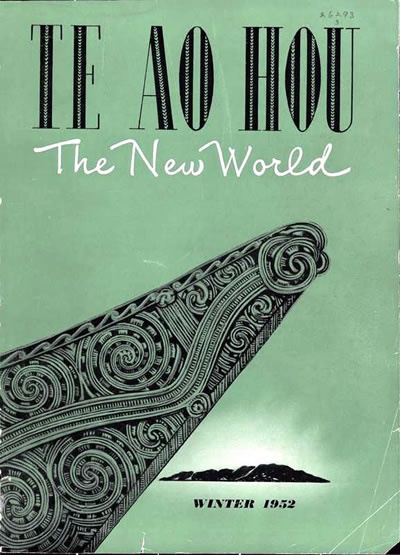Te Ao Hou | NZHistory, New Zealand history online
HOME IMAGES AND MEDIA PHOTOS TE AO HOU
Te Ao Hou

Cover of the first edition of Te Ao Hou / The New World.
The New World
Te Ao Hou (1952-76) was a bilingual quarterly published by the Maori Affairs Department and printed by Pegasus Press. According to its first issue, its intention was 'to provide interesting and informative reading for Maori homes … like a marae on paper, where all questions of interest to the Maori can be discussed'. Now available online, it is an invaluable resource for anyone interested in researching Māori topics.
The magazine's content ranged from agricultural stories, recipes and articles on woodcarving and other crafts to bilingual presentations of legends and poems. From 1954 it was edited by Erik Schwimmer, who was temporarily replaced by Bruce Mason in 1960-61. The editor from 1962 to 1966 was Margaret Orbell, who expanded the literary content and coverage, publishing a major series by the ethnomusicologist Mervyn McLean and reprinting material by the 19th-century scholar John White. Orbell was succeeded by Joy Stephenson, who continued to publish much fiction and poetry.
Notable contributors to Te Ao Hou included Hirini Mead, Pei Te Hurunui Jones, Joan Metge, J.C. Sturm, Rēweti Kōhere, Kīngi Īhaka, Maharaia Winiata, Turoa Royal, Patricia Grace, Barry Mitcalfe and Hone Tuwhare. Work by older poets and storytellers such as Mohi Tūrei was also revived, and there were annual literary competitions in both Māori and English.
As early as 1959, Schwimmer commented on 'a quite recent development, the emergence of Maori writers attempting the novel, the short story and modern verse forms … Altogether there must have been some dozens of Maoris who have recently started to write short stories, some with definite success'. The following year, after judging a writing competition (won by Pita Sharples), he went further:
The Maori writer seems instinctively to understand that the English language is one of unrivalled majesty and richness, not, as many pakehas demonstrate, a convenient method of shorthand. I expect – I say this in full confidence – that the next ten years will produce a Maori novelist of outstanding talent; already the ground is being prepared for him.
Nine years later Witi Ihimaera published his first book.
No comments:
Post a Comment